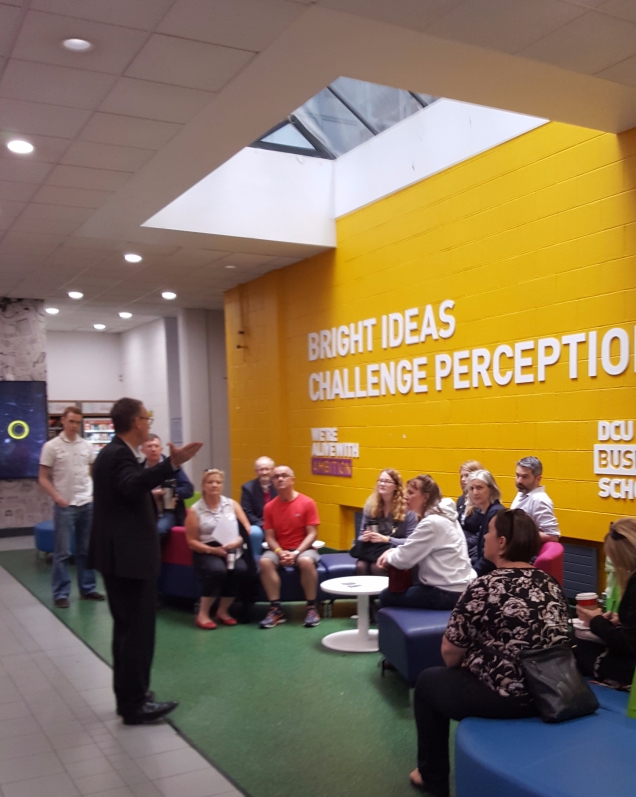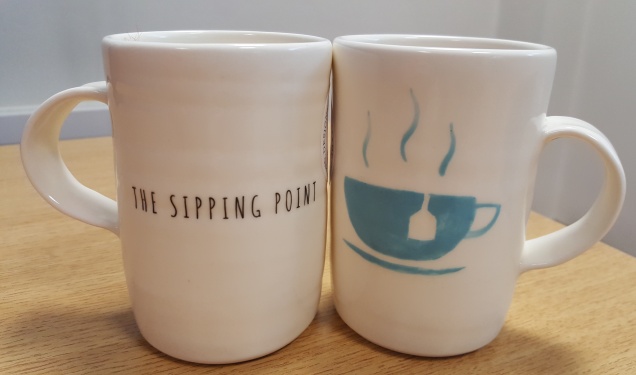In this post I would like to share some early reflections on The Sipping Point community which recently started up at DCU. Drawing loosely on the concept of Wenger’s community of practice, the idea of The Sipping Point is to provide an opportunity for staff with a shared interest in teaching to interact with each other in a non-formal setting. The basic premise is to try to foster a climate where staff across all disciplines can potentially learn from colleagues about aspects of teaching practice. The result so far is a gathering of members who meet up for one hour once a month to hear about and discuss various approaches that peers are adopting in their teaching context.
Why this format?
Based on feedback and research into various academic professional development (APD) courses offered by our unit, (you can read more about those in Gormley, O’Keeffe & Ferguson (2017)), it is clear that not all staff can or wish to commit to the timeframes involved in our accredited offerings. Even for those who do complete these courses, there are limited opportunities for a cohort to continue their learning community and interact further once the module(s) have completed. Once-off workshops are also problematic since they don’t tend to engage lecturers deeply over a period of time. And I think it’s fair to say that we have also noticed a general lack of awareness of what other lecturing staff at DCU are doing that might be of value/interest across the academic community.
Hence The Sipping Point – a new avenue for like-minded souls interested in discussing teaching practice – came into being in April of this year, driven by an enthusiastic combination of positive change, collegiality and coffee. The general format is a one-hour session led by at least one lecturer presenting on a predetermined aspect of their practice for 10 minutes. After that, the topic goes open to the floor for general questioning and discussion. We meet at all three DCU campuses (Glasnevin, St Patrick’s and All Hallows) over the last week of the month.
So how has it gone down?
So far, the reaction to these sessions has been generally positive and the discussion has been lively although I should add the significant caveat that it is very early days yet. Numbers could not be described as enormous – the largest session attracted 18 participants at one campus – but we are pleased with the interest to date and, to be frank, do not expect stampede-like numbers. Initial signs are certainly promising and here’s a quick summary of what we’ve done to date:
- April – We kicked things off with information-gathering sessions where we identified big-ticket items for future discussion, such as feedback challenges, assessment of large class groups, and lack of student engagement.
- May – This month we focused on sustainable methods of giving feedback – annotated documents, peer review, and audio feedback were all discussed.
- June – Staying with assessment, we discussed various approaches including group work with peer review feedback, learning portfolios, use of video for discussion assessment, and rubrics.
- July – In a complete change of tack, and given the summery time of year, we took active participation to the next level, going on a campus walkabout with a learning spaces theme.

Any lessons learned?
While it’s certainly too early to reach any firm conclusions about this as a learning enterprise, a few things are beginning to stand out from an academic development perspective:
It’s important to meet people where they are at: I mean this in terms of participants’ geographical location (go to them rather than ask them to come to you) but also in relation to their teaching and learning goals. Not everyone may wish to make a dramatic overhaul of their assessment strategy, for example, but they may be interested in swapping small-scale ideas that can be immediately implemented and have worked well for others. Both types of interest should be facilitated and encouraged.
Don’t overdo the number of speakers: I did receive feedback to say that one of the sessions was more formal than originally anticipated. If we have too many opening speakers, or they speak more than 10 minutes, this will cut into the discussion time which is so valuable to many of those present.
Think about incentives: Anyone who has been approached to present at a session so far is giving up their time which is something that I think should be recognised. While I do hope the community will be self sustaining at some point, I probably need to bribe encourage members to present until we are well established. Tying in with the tea/coffee theme, I’ve approached a potter friend of mine at Brookwood Pottery to design a set of appropriately themed mugs as little gifts for those who take the trouble to present. Reactions to these have been great and I hope that these branded items might also serve as marketing tools in the future. See photo below.

Of course further research will be required to find out what, if any, type of effect is happening as a result of these sessions. Tea-drinking is almost a national sport in Ireland but is conversation about teaching useful to all involved? What else might be happening and are there unintended negatives to consider? Are these events serving any valuable function at all, and if so, how? More to come on this in future, I hope.
References
- Gormley, C. O’Keeffe, M. Ferguson, P. (2017) Exploring the impact of small-scale accredited professional development. In Maguire, Harding, Noonan & O’Connor (Eds.), Teachers as Learners: exploring the impact of accredited professional development on learning and assessment in Irish Higher Education. Dublin: AISHE Retrieved from http://www.aishe.org/teachers-as-learners-exploring-the-impact-of-accredited-professional-development-on-learning-and-teaching-in-irish-higher-education/
- The National Forum Report: Teaching And Learning In Irish Higher Education: A Roadmap For Enhancement In A Digital World 2015-2017. Retrieved from http://www.teachingandlearning.ie/wp-content/uploads/2015/03/Digital-Roadmap-V2-EXEC-SUMMARY.pdf
- Wenger, E., 2011. Communities of practice: A brief introduction.
Reblogged this on Debs OER Journey and commented:
Really enjoyed reading this post and it fits really well with something I have been recently looking at. Will watch with interest to see how you get on ! Thanks for sharing 🙂
LikeLike
Thanks for sharing this Clare. I love the mugs – what a great idea! We’ve tried various approaches here at NUIG, with varying success. Our lunchtime “conversations in teaching and learning”, which had a similar format to the one you describe here, were described as “therapy for academics”. But do you find that you always have the same faces at these events?
In the coming year I want to try something more closely aligned to the National Forum’s professional development framework – though still working on the format. We can compare notes at some stage.
LikeLike
Apologies for the delayed reply, Sharon, just back from hols.
That’s a very interesting point about the ‘usual suspects’ challenge. Because we’ve only been running these for four months, we’ve had a good mix of people attending to date (some familiar faces for sure) but it does seem to be attracting new members each month. Bear in mind that numbers to date are anything from 1 (lowest) to 18 (highest) per session so it’s a bit early to be definitive on figures and time will tell a fuller story. I do find myself trying to plug these as much as I can and I am inclined to think that personal invitations to people who might be interested and indeed word of mouth from previous attendees certainly helps.
Would love to compare notes further, let’s keep in touch on this! I would be delighted if attendees at ours considered it “therapy for academics” and there’s more about the value of that in this paper by Thomson & Trigwell (2016) that might be of interest, if you haven’t come across it previously: http://www.tandfonline.com/doi/full/10.1080/03075079.2016.1265498
LikeLike